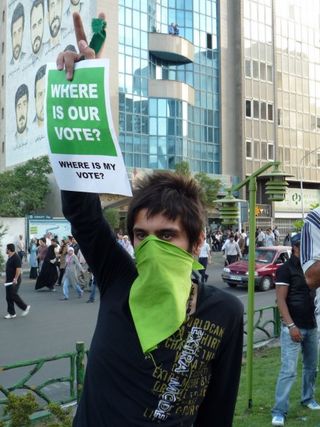
It's truly amazing flipping through Andrew Sullivan's painstaking documentation via Twitter of the Iranian resistance movement. Activists there have used Twitter, Facebook, and other social networking sites in ways that were simply unimaginable five years ago. If this isn't more evidence that the way activism works has fundamentally and forever changed, I don't know what is. But this post isn't about social networking -- we've heard all about that already.
No, this short post instead is about the ways in which this revolution must shake Americans' perception of a monolithic Middle East. We've never had much room in our brains for variation in Islam (despite, of course, our ability to laugh at the idea that all Christians believe the same things) -- and politically I think most Americans thought most Iranians were uneducated, regime-loving fundamentalists. If the Iranian people stood by while gay teenagers were publicly executed, then it must be because all Iranians assent to such a practice.
What we are seeing in Iran now is a display of the deep divisions among the Iranian people. This is not a homogeneous people. As Roger Cohen says in a NYTimes editorial, "The Iranian Republic has lost legitimacy. It is fissured. It will not be the same again. It has always played on the ambiguity of its nature, a theocracy where people vote. For a whole new generation, there's no longer room for ambiguity."
If it's true what Cohen says -- that Iran will never be the same again -- then it must also be true that our perception of Iran and the Middle East more generally will also never be the same. Twitter and other similar utilities have given Iran's people a gigantic megaphone that is reaching all corners of the world, glaringly exposing how ridiculous our uninformed perceptions of Iranians had been. Let's hope that their green scarves and tech-savvy resistance movement will help quell stereotypical perceptions of the Middle East and its people that have never been true.